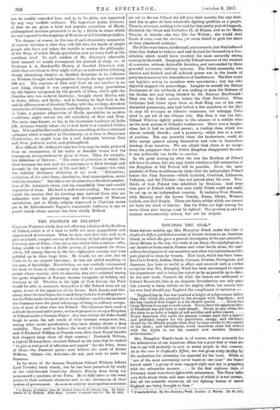THE PROBLEM OF POLAND.*
CoLoNEL Wetmore wisely does not offer any solution of the Problem of Poland,which is of a kind to baffle the moot sympathetic and experienced of statesmen. What he does, and does very well, is to give us a brief, compact survey of the history of that strange but in- teresting race of Poles—they are a race rather than a nation—who, being unable to evolve a stable systern of government for them- selves, fell among thieves in the late eighteenth century and were gobbled up in three large bites. He would, we are sure, by no claim to be an original historian; lie has not added anything to the sum of knowledge. Nevertheless, we can cordially recommend les book to those in this country who wish to understand how a people whose country, with its annexes, was once reckoned among the great kingdoms of Europe, became incapable of holding any territory at all. Whether in the light of their history- the Poles vrould be able to maintain themselves if Old Poland were set up again, is one of the questions of the future. Both Russia and Ger- many, since the war began, have made large bids for their allegiance— for the Poles make the most devoted of soldiers—and for the moment the germane have the great advantage of being in military occupa- tion of most of what once was Poland. The Germane have made a solitude there and call it peace, and now propose to set up a Kingdom of Poland under a German Prince. Any race except the Poles would laugh to scorn the soft words of their German conquerors, but, among other racial peculiarities, they have always shown a deep credulity. They used to believe the word of Frederick the Great and of Frederick William of Prussia even after those Royal bandits had chopped large slices off their country ! Frederick William, a typical Hohenaollern, invaded Poland on the plea that he wished " to give a real proof of affection and regard" for the Poles. Some of them—the Passivist party—now believe the word of Kaiser William. Others—the Activists—do not, and wish to resist the Germans.
In his story of the famous Partitions Colonel Whitton follows Lord Eversley fairly closely, but he has been preserved by study of the cold-blooded Cambridge Modern History from being too pronounced a partisan of the Poles. He is fully alive to the weak points in their national character and to the viciousness of their system of government. As Boon as entirely unacrupulous autocrats
• A History of Poland : Irons the Earliest Tines to the Present Day. By Lle t Colonel F. E. Whitton. With Maps. Loudon Constable and Co. [Ss. 131. set out to devour Poland she fell into their mouths like ripe fruit. And this in spite of their admirable fighting qualities as a people. There is, of course, nothing lobe said for that pretty pair of brigands, Frederick the Great and Catherine IL of Russia, and as for Maria Theresa of Austria—she was like the Walrus ; she would shed floods of tears over the victims, yet never failed to grab her share of their plundered territory.
The Poles were brave, intellectual, and romantic, but they believed what they wished to believe, and had devised for themselves a Con- stitution which would have wrecked the most naturally strong country in the world. Geographically Poland was one of the weakest of countries, without defensible frontiers, and surrounded by three powerful autocratic military systems. The Polish monarchy was elective and limited, and all political power was in the hands of pettylandownera or the descendants of landowners. The Diet could not legislate unless its members were unanimous ; any one who objected stopped the proceedings. Imagine to oneself the British Parliament at the outbreak of war seeking to pass the Defence of the Realm Act and being blocked by Mr. Ramsay MacDonald! That was the Polish system before the First Partition. When Catherine had thrust upon them as their King one of her own discarded paramours, and had bribed a few members of the Diet to stop all attempts at effective resistance, the unhappy Poles tried to gel rid of the liberum veto. But then it was too late. Colonel Whitton rightly points to the absence of a middle class as the most serious of Poland's wealmesses. There was a burgher class, but it had no political power ; a trading class, which was almost entirely Jewish; and a peasantry, which was in a state of serfdom. The one powerful class, the landowners, could do little except quarrel among themselves and vote to themeelvee freedom from taxation. We are afraid that there is no escape from the judgment that the Polish Kingdom disappeared because it was politically too feeble to survive.
In the great sorting-up after the war the Problem of Poland will have its place, but one may doubt whether a full restoration of the Kingdom of Old Poland will be possible. Even the most patriotic of Poles wouldsearcely claim that the independent Poland before the First Partition—which included, Courland, Lithuania, Volhynia, and the Ukraine-11as not passed away for ever. Two- thirds of that Poland was inhabited by Russians. And even that part of Poland which was once really Polish could not easily be set up as an independent country. It includes West Prussia, with Dantzig and the Lower Vistula, Posen, Silesia, Western Galicia, and Red Russia. There are limits within which one cannot set back the clock of history. But the Poles are high among the races whose past wrongs must be righted. The problem is one for anxious statesmanship indeed, but not for despair.




























 Previous page
Previous page